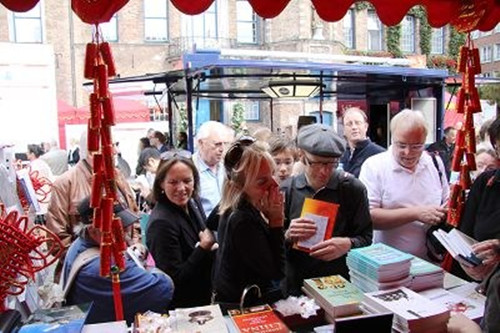 |
|
The CI Düsseldorf organizes a China festival every year, where visitors can learn elementary Mandarin skills and catch a glimpse of Chinese culture.[Chinanews.com]
|
As an associated institute, the CI is prominent in the field of China studies at Heinrich-Heine University Düsseldorf, which originally did not hold sinological seminars. Today, in cooperation with the university’s language center, the institute organizes language courses as well as single or serial lectures for local students on such topics as Chinese philosophy, history and literature.
“The courses are very well received by students and earn them credits for the university’s studium universale, which is now a required subject for all students. We and the university language center are also working on the establishment of a special China certificate, for which each student is eligible, in addition to that relating to their regular studies,” Eberspächer said.
Students gain the certificate through taking a certain number of required courses on Chinese language, culture, economy and politics. Upon finishing their studies it acts as verification of their China qualifications, for example when they apply for jobs. “It’s a kind of ‘mini-degree’ in sinology,” Eberspächer said.
Besides organizing lectures and courses the CI also supports the Heinrich-Heine University international office. “We give students guidance on whether or not to study abroad, and thus function as the university’s bridge to China,” Ebersprächer said. “Whenever contacts with China are needed, it’s us who come into play and provide guidance and resources.”
“Our Sino-German project with the university is comparable to a joint venture,” the CI director said. “And that is also where our strength lies. The Chinese side has a deep understanding of Chinese culture. We Germans, meanwhile, know our folks and understand how to present Chinese culture to them in an attractive manner. In the end, the old adage, the worm needs to be to the fish’s, not the fisherman’s, taste still holds true.”
With this principle in mind, the institute regularly organizes cultural events with a dual alignment. “On one hand, we offer events directed at an audience that already shares a general interest in China; on the other, we organize special events to arouse the interest of the broad public. Our visitors come not only from Düsseldorf but from the whole surrounding area.”
Under the slogan “the dragon dances in Düsseldorf” the CI Düsseldorf organizes a big China festival every year, where visitors can learn elementary Mandarin skills and catch a glimpse of Chinese culture. “For example, we show the development of pictographic Chinese characters on our main festival stage. Calligraphists also show visitors how to write their names in Chinese characters, which is always a highlight,” Eberspächer said. Visitors can as well take part in free trial Chinese courses, and witness the creation process of traditional Chinese arts and crafts.
Overcoming existing prejudices is a main purpose of the festival. “As in many other countries, stereotypes about China exist in Germany. Persistent, patient work over a long period of time is needed to present to the German public an unbiased image of China. It is important to display culture vividly, and on a general level, rather than to deal discretely with specific polemic problems,” the historian said.
“I made this point in my speech during the meeting in Berlin earlier this year between President Xi Jinping and German sinologists. To change stereotype images of China, we should consider a time frame not of two or three years but rather two or three decades. What we really need to be successful is persistence and patience.” The tradition of the China festival in Düsseldorf is indeed a successful example of continuity in cultural exchange.
“We also try to bring China into events that originally had no special China element,” Eberspächer said. One example is the Düsseldorf Reading festival (Lesefest), annually organized by the Düsseldorfer Lesebande.” Last year, the institute and the education authority jointly organized talks on Chinese fairy tales for local children. They were held in the lecture hall of the institute along with performances of traditional Chinese music. “Several of the school’s classes took part in the event and we successfully stimulated their thirst for more knowledge,” Eberspächer said.
We Recommend:
